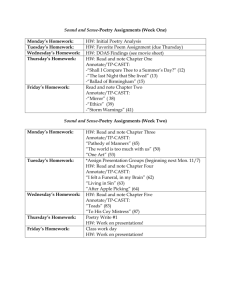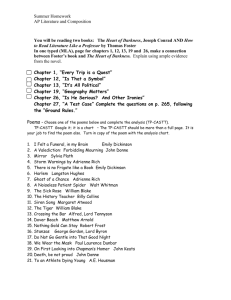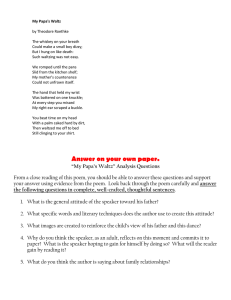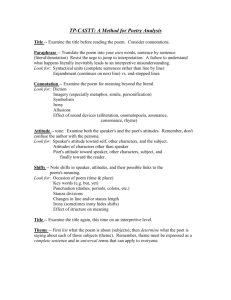Sophomore Pre-AP: English 3-4 - Phoenix Union High School District
advertisement
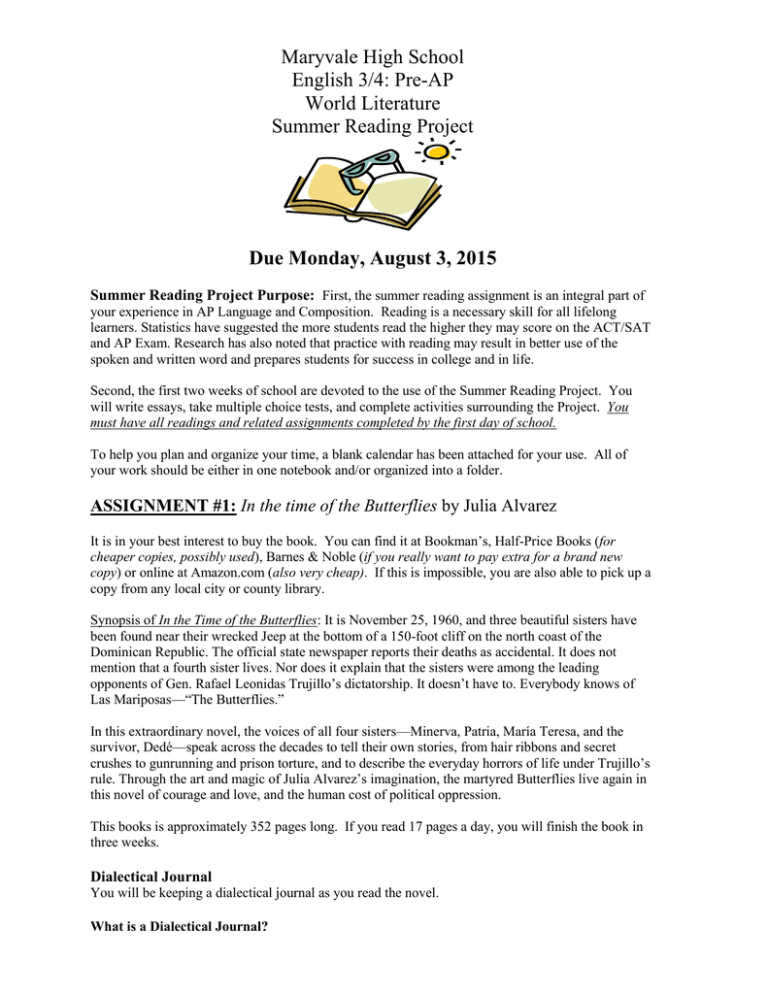
Maryvale High School English 3/4: Pre-AP World Literature Summer Reading Project Due Monday, August 3, 2015 Summer Reading Project Purpose: First, the summer reading assignment is an integral part of your experience in AP Language and Composition. Reading is a necessary skill for all lifelong learners. Statistics have suggested the more students read the higher they may score on the ACT/SAT and AP Exam. Research has also noted that practice with reading may result in better use of the spoken and written word and prepares students for success in college and in life. Second, the first two weeks of school are devoted to the use of the Summer Reading Project. You will write essays, take multiple choice tests, and complete activities surrounding the Project. You must have all readings and related assignments completed by the first day of school. To help you plan and organize your time, a blank calendar has been attached for your use. All of your work should be either in one notebook and/or organized into a folder. ASSIGNMENT #1: In the time of the Butterflies by Julia Alvarez It is in your best interest to buy the book. You can find it at Bookman’s, Half-Price Books (for cheaper copies, possibly used), Barnes & Noble (if you really want to pay extra for a brand new copy) or online at Amazon.com (also very cheap). If this is impossible, you are also able to pick up a copy from any local city or county library. Synopsis of In the Time of the Butterflies: It is November 25, 1960, and three beautiful sisters have been found near their wrecked Jeep at the bottom of a 150-foot cliff on the north coast of the Dominican Republic. The official state newspaper reports their deaths as accidental. It does not mention that a fourth sister lives. Nor does it explain that the sisters were among the leading opponents of Gen. Rafael Leonidas Trujillo’s dictatorship. It doesn’t have to. Everybody knows of Las Mariposas—“The Butterflies.” In this extraordinary novel, the voices of all four sisters—Minerva, Patria, María Teresa, and the survivor, Dedé—speak across the decades to tell their own stories, from hair ribbons and secret crushes to gunrunning and prison torture, and to describe the everyday horrors of life under Trujillo’s rule. Through the art and magic of Julia Alvarez’s imagination, the martyred Butterflies live again in this novel of courage and love, and the human cost of political oppression. This books is approximately 352 pages long. If you read 17 pages a day, you will finish the book in three weeks. Dialectical Journal You will be keeping a dialectical journal as you read the novel. What is a Dialectical Journal? A dialectical journal is another name for a double-entry journal or a reader-response journal. A dialectical journal is a journal that records a dialogue, or conversation between the ideas in the text (the words that you are reading) and the ideas of the reader (the person who is doing the reading). This is what you must do in your journal-keep a dialogue with yourself. In your journal, have a conversation with the text and yourself. Write down your thoughts, questions, insights, and ideas while you read. A dialectical journal can include all sorts of things: class notes, notes on discussions, notes on papers, reactions to readings. The important part is that you, the reader, are reading something and then responding to it with your feelings and ideas! What type of Notebook Should I Use? Your journal must either be a composition notebook or a spiral-bound notebook. Loose-leaf paper and folders are not appropriate. Alternatively, you can type your journal. How Do I Keep A Dialectical Journal? Your journal will use a two-entry form: Fold the page in half (or create columns in a word processing program). In the LEFT COLUMN, write down parts of paragraphs from our books and articles, quotes, or notes from class that you think are interesting or important along with MLA citation. In the RIGHT COLUMN, write down YOUR OWN thoughts, commentary, and questions about the information in the LEFT COLUMN. Paragraphs and quotes from the book using MLA citation Your thoughts, comments and questions related to the paragraphs and quotes When I am writing in my Dialectical Journal, is there a Right and Wrong Answer? NO! A dialectical journal shows your own thoughts and ideas about what you read. When you right in your journal, you should be as original and creative as you can be. The sky’s the limit! However, consider the following to guide you responses: Who are the characters? What do their actions tell you about them? What are the themes in the novel? How do these themes connect in the novel? How do they connect to you as the reader? What were the major events in each chapter? How do these events shape the conflict, characters, or themes? What passages stand out as important to you? Why do you think they are important? Do you notice any patterns in the novel of objects, phrases, situations, or ideas? Why do you think these patterns were included? Question – ask about something in the passage that is unclear. Connect – make a connection to your life, the world, or another text. Predict – anticipate what will occur based on what’s in the passage. Clarify – answer earlier questions or confirm/disaffirm a prediction. Reflect – think deeply about what the passage means in a broad sense – not just to the characters in the story/author of the article. What conclusions can you draw about the world, about human nature, or just the way things work? Evaluate - make a judgment about what the author is trying to say. How many entries should I have? You should have a minimum of 50 Journal Entries the span the ENTIRE novel. For additional information, see the attached EXPANDED EXPLANATION OF DIALECTICAL JOURNALS. What do I need to do? Purchase the book immediately Pace yourself to complete the book, while keeping in mind your other assignment requirements. Use the paper provided in your Supplemental Packet Complete at least 50 journal entries that span the ENTIRE novel. ASSIGNMENT #2: Shooting an Elephant by George Orwell Rhetorical Analysis As you read the short story, answer and complete the following questions. Your responses should be thorough and display your understanding of the story. Use textual evidence to support your responses. You must use MLA style citations. 1. What is the rhetorical situation? What occasion gives rise to the need or opportunity for this writing? What is the historical occasion that would give rise to the composition of this text? 2. Who is the author/speaker? How does he or she establish ethos (personal credibility)? Does he/she come across as knowledgeable? Fair? Does the speaker's reputation convey a certain authority? 3. What is his/her intention in speaking? To attack or defend? To exhort or dissuade from certain action? To praise or blame? To teach, to delight, or to persuade? 4. Who makes up the audience? Who is the intended audience? What values does the audience hold that the author or speaker appeals to? Who have been or might be secondary audiences? 5. What is the content of the message? Can you summarize the main idea? What are the principal lines of reasoning or kinds of arguments used? How does the author or speaker appeal to reason? To emotion? 6. What is the form (organization) in which it is conveyed? What is the structure of the communication; how is it arranged? What oral or literary genre is it following? What figures of speech (analogies, similes, metaphors, etc.) are used? What kind of style and tone is used and for what purpose? 7. How do form (organization) and content (main ideas) connect? Does the form complement the content? What effect could the form have, and does this aid or hinder the author's intention? 8. Does the message/speech/text succeed in fulfilling the author's or speaker's intentions? For whom? Does the author/speaker effectively fit his/her message to the circumstances, times, and audience? Can you identify the responses of historical or contemporary audiences? 9. What does the nature of the communication reveal about the culture that produced it? What kinds of values or customs would the people have that would produce this? How do the allusions, historical references, or kinds of words used place this in a certain time and location? What do I need to do? Read and annotate the short story in your supplemental packet Thoroughly answer the nine questions above in your supplemental packet ASSIGNMENT #3: Editorials/Articles “Our Africa Lenses” by Chimamanda Ngozi Adichie and “Chester Nez, last of the original Navajo code talkers of World War II, dies at 93” by Elaine Woo SOAPSTone The acronym ―SOAPSTone – is a helpful way for you to remember essential elements for analysis of texts such as essays, articles, and other non-fiction works. You will be completing several SOAPSTones for non-fiction articles. Speaker—the voice that tells the story—includes name of author as well as important facts about author that help assess assumptions underlying his or her position. Occasion—the time and place of the piece—the context that encouraged the writing to happen— usually both a large and an immediate occasion. Audience—the group of readers to whom the piece is directed. Purpose—the reason behind the text—what the speaker wants the audience to think or do. Subject—the general topic, content, and ideas contained in the text. Tone—the attitude of the author—helps to extend meaning beyond the literal. What do I need to do? Annotate/mark the text on BOTH of the editorials/articles in your supplemental packet. Complete a SOAPSTone for each article in your supplemental packet. ASSIGNMENT #4: Play- “Master Harold” and the boys by Athol Fugard Read the supplement entitled “Dante’s Fourfold Method”. You will annotate the play using these four methods. The literal or historical level examines what is actually happening in the story on a surface level. To completely understand the literal level, one must also understand the historical context of the story. The political level is the level on which human beings relate to others in a community and in the world. The moral or psychological level is the way in which the self relates to the realm of ethics – the struggle of one’s conscience. The spiritual level is the universal level on which a person relates to the cosmos, the way of the pilgrim soul – an examination of the human’s role in the grand scheme of things. After you read and annotate for Dante’s Fourfold Method, write a paragraph for EACH of the levels using information from “Master Harold” and the boys by Athol Fugard. What do I need to do? Carefully read about Dante’s Fourfold Method in your supplemental packet. Read and annotate the play for its literal/historical, political, moral/psychological and spiritual relevance in your supplemental packet. Write a paragraph that analyzes each of the four levels (a minimum of four). Included MLA citations for the evidence that you include. This should be completed in your supplemental packet. ASSIGNMENT #5: Poem- “The Second Coming” by W B Yeats The Second Coming by W B Yeats is one of Ireland’s most popular poems. Yeats wrote it just after the end of World War I and captured the mood of people in Europe in the poem. There have references to and quotes from The Second Coming in countless TV programs and films over the years, including The Sopranos, Sons of Anarchy and Heroes. Read the elements of TP-CASTT which is a method to analyze any poem. Read and annotated “The Second Coming” using the elements of TP-CASTT. After reading the poem, complete the TP-CASTT chart in the appendices. Use as much detail and analysis as possible. TP-CASTT Poetry Analysis TITLE: Consider the title and make a prediction about what the poem is about. PARAPHRASE: Translate the poem line by line into your own words on a literal level. Look for complete thoughts (sentences may be inverted) and look up unfamiliar words. CONNOTATION: Examine the poem for meaning beyond the literal. Look for figurative language, imagery, and sound elements. ATTITUDE/TONE: Notice the speaker’s tone and attitude. Humor? Sarcasm? Awe? SHIFTS: Note any shifts or changes in speaker or attitude. Look for key words, time change, punctuation. TITLE: Examine the title again, this time on an interpretive level. THEME: Briefly state in your own words what the poem is about (subject), then what the poet is saying about the subject (theme). What do I need to do? Read the poem Read the elements of TP-CASTT Read the poem again and annotate for TP-CASTT in your supplemental packet. Complete the TP-CASTT chart included in your supplemental packet. Final Thoughts: Remember, all of your work should be either in one notebook and/or organized into a folder. If you need another copy of this assignment, you can find it on the Maryvale English Department website: Maryvale High School > Academics > Academic Departments > English > Summer Reading Projects. If you have any questions or confusion about the assignments, I would be happy to answer your questions and/or clarify the assignment for you. When you contact me, please include your name, the best e-mail address to respond to you, and your questions. My e-mail address is raycoterry@gmail.com Happy summer reading! Ms. Branch Summer Reading Project Rubric Assignment #1 Dialectical Journal ___/25 ___/50 Properly formatted as directed. Every entry has a MLA citation, and indicates selections from beginning, middle, and end of book. ___/150 “from text” are one or more complete sentences; 50 or more from entire book; contains no spelling errors. ___/150 “from me” have two or more complete sentences; shows fully developed thoughts/connections; 50 or more total entries; contains no spelling errors. Total: __________________/ 375 Assignment #2 ___/100 Rhetorical Analysis Answered all questions; responses are thorough and display understanding of the short story; uses textual evidence to support responses; responses are written in complete sentences; contains minimal grammatical errors; used MLA citations. Total: __________________/ 100 Assignment #3 ___/50 ___/100 SOAPSTone Each article is annotated. Two SOAPSTones completed; responses include textual support. Total: __________________/ 150 Assignment #4 ___/100 ___/100 Dante’s Fourfold Method ENTIRE play is annotated for historical, political, moral and spiritual evidence. Four Comprehensive paragraphs that reflect analysis and have textual support. Total: __________________/ 200 Assignment #5 TP-CASTT ___/50 Poem is annotated for elements of TP-CASTT ___/50 TP-CASTT chart is complete Total: __________________/ 100
